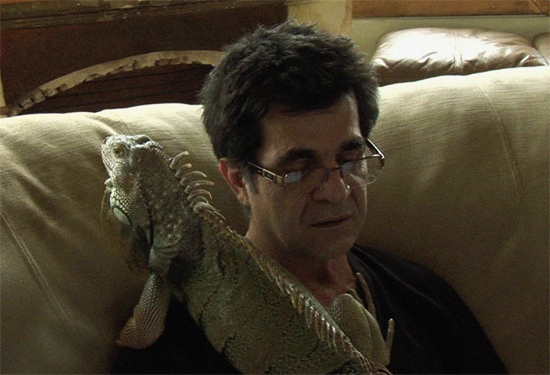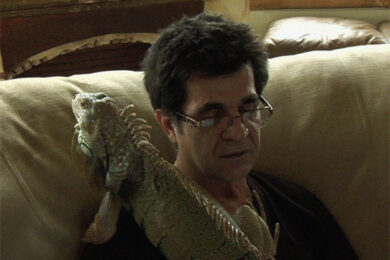Provocative Cannes/Venice/Berlin-winning Iranian director Jafar Panahi spent 2010 being arrested, released, arrested again, detained, bailed and finally charged and sentenced to six years in jail and given a twenty year ban on filmmaking, leaving the country and talking to the press.
In terms of potential ‘watchability’ and enjoyment, the odds are stacked against This Is Not A Film from the start. Man in an apartment, banned from making films, makes video-diary quasi-film in order to make a political point. It could have ended up dry and worthy, but Jafar Panahi is a master shaper of celluloid reality and the subtlest of storytellers, and his first non-fiction film is a finely crafted delight.
Deeply frustrated by the forced curtailment of his creativity, he calls a friend, fellow filmmaker Mojtaba Mirtahmasb. As he explains to Mirtahmasb, on camera, he may be banned from directing and from writing screenplays, but he has an already-written script to hand, which he had started production on before his arrest. He suggests that Mirtahmasb film him reading the screenplay aloud – this, he contends, is not the same as him making a film.
Watching Panahi as he proceeds to mark out the boundaries of an imagined set in masking tape on his living room carpet is at once a magnificent insight into the mind of a director, and a sad pantomime of futility – is this really all that he can do now?
Acting within this crudely demarcated floor-space looks strangely like Dogville. The comparison to Lars Von Trier’s bare staging is strong, and it’s a useful reminder that an audience doesn’t need convincing sets and lifelike verisimilitude to connect with a story… but you really do need more than a man clutching a script and describing the action.
Panahi knows it too and loses faith in the project, breaking down during his recital and asking Mirtahmasb the central question at the heart of his endeavours, "if we could tell a film, then why make a film?", before packing the whole project in, and trying to make his ‘not-film’ in another way.
With his screenplay-reading project abandoned, we are left to feel the claustrophobic weight of housebound life – Panahi spends his time with laptop on lap, making phone-calls to lawyers, and feeding the other inhabitant of the apartment, the family’s giant pet iguana that languidly roams its territory with exquisite comic timing. The deep humanity of this film is never more strongly felt than in these quiet moments and the humour and warmth that come from capturing the iguana making slow progress up a bookshelf or across Panahi’s chest are a gift.
These are the shifting sands of This Is Not A Film. The focus moves and changes as if organically, not by will or design. (After all, it isn’t being directed – directing would be illegal for Panahi).
Panahi and Mirtahmasb needle away at the question of ‘the director’ over the course of the film. Mirtahmasb is credited as director of this film, of course, but Panahi is the mind behind it. Moments of wry humour emerge in what a struggle it is for Panahi to give up the reins of direction. He calls ‘cut’ and Mirtahmasb obstinately keeps filming. If he’s going to do it, he wants to do it his own way. The relationship between the two men is delicately drawn; these are collaborators who understand each other, who trust each other and challenge each other.
Eventually, Panahi picks up his camera phone and begins to film too. Mirtahmasb comments, "They say when hairdressers have nothing to do, they cut each other’s hair". He clearly can’t stop himself from making films and expressing himself, but of course there’s more than that at play here. The ‘fly-on-the-wall’ style and casual attitudes of Panahi and Mirtahmasb belie a finely tuned and carefully nuanced communiqué to the world outside Iran. Panahi faces six years in jail and a 20 year ban and no-one within Iran can do anything to secure an acquittal. He speaks to his counsel and is told the only thing that might make a difference is some "very strong pressure" on the courts. His only hope, then, is the international filmmaking community. This is the message he was sending to Cannes’ media-saturated Croisette when he smuggled This Is Not A Film to France on a USB hidden inside a cake.
Watching at this later date with the knowledge that his sentence was upheld (the full six year jail term and 20 year ban) and that Mirtahmasb has since been arrested himself adds an unbearable, bitter irony to these moments.
In the closing sequence of the film, Panahi has made a long, slow, comical descent to the ground floor of his apartment block while interviewing the building’s temporary caretaker as he collects rubbish from each floor. He steps out of the lift and sees, beyond the compound gates, the streets alive and wild and crackling with fire, as a fireworks celebration borders on lawlessness and disorder.
Seeing through Panahi’s camera lens, you can feel with almost physical force how much he is drawn to the street outside, to the life the he is barred from participating in, from recording, but before he can step to the gate, the caretaker entreats him not to venture out – "they’ll see you with your camera".
This Is Not A Film is a gorgeously rich, moving work that is a warning flag of what will be lost if filmmakers like Panahi and Mirtahmasb are silenced.



